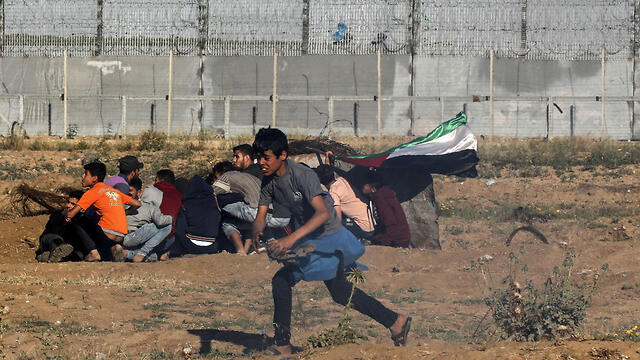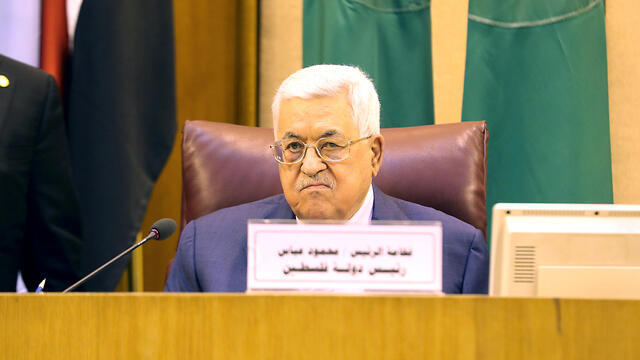Getting your Trinity Audio player ready...
Had it not been for the latest deadly flare-up between Hamas and Gaza, which raised the tension on the southern border even more, Nakba Day would have passed unnoticed for most Israelis. This year, one of the most important dates in the Palestinian calendar overlapped with the Eurovision Song Contest being held in Tel Aviv, making the disparity between the two sides more evident than ever.
and Twitter
While we’re broadcasting the hedonistic celebrations live from Tel Aviv, in Gaza, thousands of people were queuing for a chance to get $100 donation from the Qataris in order to break their Ramadan fast with some kind of a meal and feed their families.
When you can't muster any more energy to fight your battles fairly, what you have left is destroying what the other side has. On Wednesday’s Nakba Day, the Palestinians marked 71 years since what they call “the catastrophe” occurred. Right now, the Palestinians are at a low point, the lowest maybe, since 1948.
Even before the Trump administration began working on its peace plan (dubbed “the deal of the century”), before the Palestinians lost a lot of its support in the Arab world and before the results of the Israeli election, they were caught in the midst of intra-Palestinian conflict. It has been 12 years since Hamas took over the Gaza Strip from the Palestinian Authority and created their own “two-state solution,” except in this case both states are Palestinian.
Those in the West Bank have become quite indifferent to the fate of their brothers and sisters in the Gaza Strip, who over the past year have been staging mass - and sometimes deadly - border demonstrations with a goal to lift the blockade of the coastal enclave. This is the biggest indication yet that the Palestinians have not yet matured for a state of their own. A nation fighting for independence simply can’t afford to have such a deep geographical and political divide.
The dwindling support for the Palestinians in the rest of the Arab world is also not something they were prepared for. The response of Crown Prince of Saudi Arabia Mohammad bin Salman and Egyptian President Abdel Fatah al-Sisi to the recent Palestinian misfortunes has been quite likewarm, not only because their relations with Israel are more beneficial, but also because the public opinion in the Arab world on the issue of the Israeli-Palestinians conflict has shifted.
For years, “the Palestinian issue” has been considered sacred and used by local leaders as a diversion during the times of domestic crises. Now, the views on the matter are split, with some believing the Palestinians are the ultimate victim, while others have openly began to call them terrorists.
The only bright spot for the Palestinians recently has been the return of the Israeli-Palestinian debate to the US politics, via the new and vociferous congresspeople from the Democratic Party, whose pro-Palestinian views are becoming aligned more and more with the left-wing in Europe rather than those of their predecessors.
Palestinian President Mahmoud Abbas who has burned every possible bridge with the current US administration, is counting on the American public not to reelect Donald Trump for a second term, which would effectively help swing the pendulum to the other side as far as he’s concerned.
In Gaza, there is an entire generation - battered and wasted - that has grown up in an Islamist regime and terrible poverty, in a bubble nobody can escape. The West Bank’s Millennial generation is in a much better position - educated and connected - but also with very limited opportunities. In both cases, there aren’t many prospects. Without a clear national strategy and with an aging leadership that isn’t going anywhere, young people rely on clichés and slogans, and cling to their dream of one day returning to Palestine. This ideology is being fed to them since infancy and it accompanies them most of their adult lives.
What does this situation say about us? We have a neighbor, who is miserable and desperate, and although Israel has no interest in aggravating the already unbearable situation for the Palestinians, it doesn’t intend to make any dramatic moves to improve it either. Abbas, meanwhile, outright rejected the chance to even discuss the Trump administration's
peace plan (contrary to the advise of the Saudis) before having even seen it.
The least that can be done in the meantime is to avoid - at all costs - any further violence that would deteriorate the humanitarian situation even further. If it is impossible to dramatically change the reality, it’s definitely possible not to make it worse.



